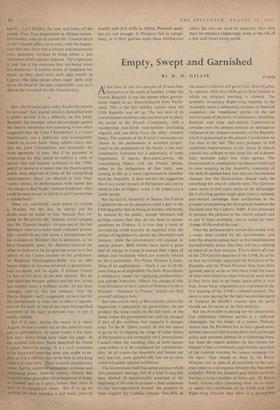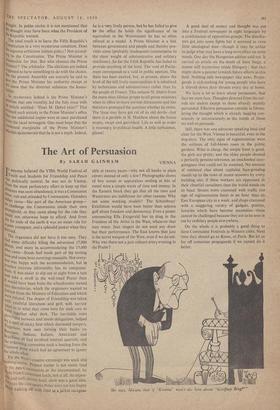Empty, Swept and Garnished
By D. R. G1LLIE PARIS
Athis time of year the energies of France lose themselves in the sands of holiday. Under the Fourth Republic it was the season when govern- ments hoped to act disencumbered from Parlia- ment. This is the first holiday season since the Fifth Republic was set up. The last item of its constitutional machinery has just been put in place, the senate of the French Community, with a membership two-thirds metropolitan (including Algeria) and one-third from the other member States. The senators of the French Community are chosen by the parliaments in numbers propor- tional to the population of the States; it has only consultative functions but is potentially of some importance. It shares, Box-and-Coxwise, the Luxembourg Palace with the French Senate, rather to the indignation of that body, now coming to life as a more representative chamber than the Assembly. It does not like the suggestion that it is a minor branch of Parliament and can be asked to take in lodgers—even if the lodgers are a junior senate.
But the fact is, Assembly or Senate, the French Legislature has so far played so small a part in the Fifth Republic that its being on holiday will barely be noticed by the public, though Ministers will perhaps rejoice that they do not have to answer questions on Fridays. It is true that a burst of law-making could scarcely be expected after the torrent of legislation by decree last December and January, while the Government still enjoyed its special powers. Both houses have spent a great deal of energy in trying to extend their rights of debate and resolution which are severely limited by the Constitution. The Prime Minister is some- thing of an anglomaniac—which is not at all the same thing as an anglophile. He finds Westminster a satisfactory model for regulating parliamentary and judicial behaviour. (Hence his change of title from President of the Council of Ministers to Virst Minister—`Monsieur le Premier' should you find yourself talking to him.) But rules which work at Westminster, where the Opposition is potentially the government, do not produce the same result on the left bank of the Seine, where the government can only be changed if part of the coalition that supports it changes sides. To do M. Debrd justice, he did not intend to go so far in clipping the wings of either house of Parliament as did eventually the Constitutional Council when the standing rules of both houses came before it to be considered for constitution-. ality. At all events the Assembly and Senate not only lost but, more painful still, lost on an .issue which left public opinion indifferent.
The Government itself has raised an issue which stirs passionate feelings, but of a kind it may not have desired. It optimistically promised at the beginning of the year to propose a final settlement of that inextinguishable fireball, the problem of State support for Catholic schools. One-fifth of the nation's children still go to 'free,' that is Catho- lic, schools, while four-fifths go to State schoOls in which no religious teaching is allowed. The probably temporary Right-wing majority in the Assembly wants a substantial increase of financial assistance; the 'republican' parties—in the old narrow sense of the term—Communists, Socialists, Radicals and some anti-clerical Conservatives consider even the present pittance an outrageous violation of the religious neutrality of the Republic which is guaranteed in the present Constitution no less than in the last. The mere prospect of still undefined improvements in the status of church schools has sufficed to put some life (of a doubt- fully desirable kind) into these parties. The Government in consequence has become timid. but its own majority in the Assembly, conscious of the shift of opinion back into old ruts, has become clamant that the Government should really do something for church schools now. The Govern- ment seems to feel more alarm at the advantages the Left-wing parties might gain from a rampant anti-clerical campaign than satisfaction at the prospect of deepening the divergencies between the Socialists and the Catholic M RP. It has promised to increase the pittance to the church schools and to pay it more promptly, but to make no other change till the end of the year.
Thus the parliamentary session has ended with a major issue evaded by the Government, and with the deputies going back to the constituencies uncomfortably aware that they will have nothing to boast of to their electors. This is above all true of the 210 Gaullist deputies of the UN R. In so far as they have blindly supported the President of the Republic and his Prime Minister they have been ignored, and in so far as they have lined the route of their own choice to cheer him as he went clown it they have had to go home again after a vain wait. Some bitter impatience was expressed at the first meeting of the UN R's national council. The party is now paying for the light-hearted disregard of General de Gaulle's request that no party should use his name at the last elections.
But the President is paying for the assumption that arbitration between parties is a sufficient philosophy for the leader of a nation. Nobody doubts that the President has in fact a good many definite ideas and that in some fields such as foreign policy and national defence he is following them, but since the august position he has chosen for himself is that of arbitrator: and ultimate guardian of the national interests, he cannot campaign for his ideas. That should be done by his Prime. Minister, but in spite of all assertions to the con- trary there is a divergence between the two men's attitudes. While the General goes about carefully leaving a certain number of doors ajar, Ni. Debre busily follows after slamming them to, in order to satisfy the complaints of the UN R and other Right-wing deputies that there is a perceptible 'naught. In polite circles it is not mentioned that the draught may have been what the President of the Republic wanted. The total result is to leave the Fifth Republic's Constitution in a very mysterious condition. Does the supreme arbitrator initiate policy? Not accord- Ing to the Constitution. The Prime Minister is responsible for that. But who chooses the Prime Minister? The arbitrator. The elections are indeed 1;111)Posed to have something to do with the choice. ut the present Assembly can scarcely be said to the the Prime Minister his authority except in h e sense that the doormat enhances the house- So mysterious indeed is the Prime Minister's an that one monthly led the July issue with gn article entitled : 'Does M. Debre exist?' This a that such anxiety in the Prime Minister's office t at ten additional copies were at once purchased [fl r°111 the local newsagent. One must hope that the Nbined marginalia of the Prime Minister's attaches demonstrate that he is not a myth. Indeed, he is a very lively person, but he has failed to give to the office he holds the significance of its equivalent in the Westminster he has so often offered as a model. A Prime Minister is a link between government and people and thereby pro- vides some (probably inadequate) counterpoise to the sheer weight of administrative and, military machinery—So far the Fifth Republic has failed to provide anything of the kind. The void of Parlia- ment corresponds to a void in public opinion, The State has been exalted, but, at present, above the level of the still lively municipalities it is inhabited by technicians and administrators rather than by the people of France. This reduces M. Debre from the more-than-lifesize proper to all prime ministers when in office to more normal dimensions and has therefore prompted the question whether he exists. The State may have got rid of its old devils—but there is a parable in St. Matthew about the house empty, swept and garnished. Life as well as order • is necessary to political health. A little turbulence, please!



































 Previous page
Previous page